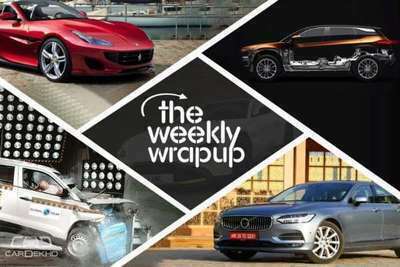Nutson's Weekly Automotive News Wrap-up October 29, 2023
 |
 |
LEARN MORE: Complete versions of today's news nuggets, along with thousands of pages of relevant news and opinions, information stored in a million-page library published and indexed on The Auto Channel during the past 25 years. Complete information can be found by copying a headline and inserting it into any Site Search Box.
Here are Larry's picks among the past week's important, relevant, semi-secret, or snappy automotive news, opinions and insider back stories presented as expertly crafted easy-to-understand automotive universe news nuggets. for Nutson's Auto News Weekly Wrap-up October 22-28, 2023
* The Wall Street Journal, in an opinion, provides some clarity as to why the automakers, especially the Detroit 3, oppose a proposed Federal rule that would reduce the credits under CAFE standards for producing EVs. Right now the fuel economy equivalent credit for a EV is very high which allows for a very high offset in the production of less efficient large trucks and SUVs. "Excessively high imputed fuel economy values for EVs means that a relatively small number of EVs will mathematically guarantee compliance." Simply, one EV allows for lots of pickups, as an example. The Journal writes: "Unrealistic fuel economy standards combined with inflated credits for EVs have let auto makers pretend that their cars and trucks are more efficient than they are." D3 automakers would be slammed by an EV credit reduction because pickups and SUVs make up a large share of their fleets. On the flip side, the government wants the automakers to manufacture more EVs to meet Cafe standards.
* The week started off with the UAW expanding its strike to a Stellantis plant in suburban Detroit that produces Ram full-size pickup trucks. The work stoppage includes roughly 6,800 workers at Stellantis’ Sterling Heights Assembly Plant in suburban Detroit. Midweek headlines read that UAW now wants at least 25% raises, 2 percentage points above the raises proposed by Ford, General Motors and Stellantis. And then, progress! UAW called off it's strike against Ford after tentative contract reached with 25% raises. If (IF) ratified, the deal would provide roughly 57,000 hourly Ford workers with 25 percent raises over four years and bring an end to a 6-week-old strike. Of note, Ford says the new UAW deal will increase labor costs by $850 to $900 per vehicle and the strike itself cost $1.3 Billion.
* And then---late Friday a deal with Stellantis was announced that is expected to mirror the Ford agreement. The deal includes building a midsize pickup truck at the Belvidere, Illinois, assembly plant that Stellantis idled earlier this year. Add this---shortly after announcing a tentative agreement with the second of the Detroit Three automakers, the UAW expanded its strike against the third company, ordering workers to walk out of GM's Spring Hill Assembly Plant in Tennessee, UAW Local 1853 announced Saturday evening on Facebook.
* US DoE factoid of the week: Historically, there has been somewhat of an inverse relationship between vehicle miles traveled (VMT) and gasoline prices. In the past, a rise in gasoline prices was typically followed by a decrease in discretionary travel, leading to a decrease in VMT. This set up a pattern where the gasoline price and VMT trendlines almost mirrored each other. In 2020, during the COVID-19 pandemic, there were severe disruptions in VMT that broke that pattern. Gasoline prices and VMT were both going down at the same time from March 2020 to March 2021 and then both increased thereafter. In early 2022 both gasoline prices and VMT experienced another large decline with the VMT decline preceding the decline in gasoline prices.
* An unprecedented ecosystem of 19 leading innovators in the automotive, bicycle and technology sectors have joined forces to work towards advancing and deploying connected transportation solutions to help reduce the risks facing cyclists and e-bike riders on North American roads. The new Coalition for Cyclist Safety represents a commitment to develop a comprehensive approach to bicycle safety centered on deployments of vehicle-to-everything technology. According to the U.S. Centers for Disease Control, bicycles constitute one percent of all trips across the United States, but represent two percent of all traffic fatalities. More than 130,000 cyclists suffer injuries a year riding bicycles in U.S. traffic.
* The average price Americans paid for a new vehicle in September 2023 was down 3.4% from the start of the year, as higher inventory levels and increased incentives continued to put downward pressure on pricing. The average transaction price of a new vehicle in September was $47,899, down $360 from one year ago (0.7%), according to Kelley Blue Book, a Cox Automotive company. Prices decreased by $227 (0.5%) from August’s downwardly revised ATP of $48,126.
* The Kia EV6 GT was recognized amongst the TIME Best Inventions of 2023 within the Transportation category. The annual list, which has been compiled for over two decades, features 200 extraordinary innovations, including new products and ideas, that TIME editors have identified as “changing our lives.” To compile the list, nominations are collected from TIME’s editors and correspondents around the world, and through an online application process, paying special attention to growing fields—such as AI, green energy, and sustainability. The editors then evaluate each contender on a number of key factors, including originality, efficacy, ambition, and impact. “The result is a list of 200 groundbreaking inventions (and 50 special mention inventions)—including the world's most powerful supercomputer, a game-changing entertainment venue, and a new shape—that are changing how we live, work, play, and think about what’s possible,” said the TIME editors.
* On October 24 The California Department of Motor Vehicles issued the following statement on the immediate suspension of Cruise LLC’s deployment and driverless testing permits: "Public safety remains the California DMV’s top priority, and the department’s autonomous vehicle regulations provide a framework to facilitate the safe testing and deployment of this technology on California public roads. When there is an unreasonable risk to public safety, the DMV can immediately suspend or revoke permits. There is no set time for a suspension. The California DMV today notified Cruise that the department is suspending Cruise’s autonomous vehicle deployment and driverless testing permits, effective immediately. The DMV has provided Cruise with the steps needed to apply to reinstate its suspended permits, which the DMV will not approve until the company has fulfilled the requirements to the department’s satisfaction. This decision does not impact the company’s permit for testing with a safety driver." Media reports say Cruise ‘misrepresented' and ‘omitted' key safety information, according to California DMV.
* Most all have experienced the often boring wait for vehicle service at a dealer. Automotive News reports a Subaru dealer is offering a different type of loaner ride. Dwayne Lane's Skagit Subaru, located north of Seattle, takes advantage of its proximity to a winding river by offering customers the option of borrowing a bicycle. For the most part, customers go for a 30 to 45 minute bike ride rather than use the bike like a loaner car.
* The Detroit Free Press reports Honda Motor and General Motors are ending their plan to jointly develop affordable electric vehicles together, GM confirmed Wednesday. The news first came from Honda CEO Toshihiro Mibe during an interview with Bloomberg. "After studying this for a year, we decided that this would be difficult as a business, so at the moment, we are ending development of an affordable EV," Mibe said in the interview. A GM spokesperson is quoted as saying "Each company remains committed to affordability in the EV market."
* California Gov. Gavin Newsom signed a law that lifts the restrictions on lowrider cruising, a cultural and artistic tradition developed by Latinos living in the Golden State. Lowrider culture was developed by Mexican Americans in and around Southern California after World War II. Through the years, some police officers harassed the lowriders, who were usually Latino, and broke up cruising events. California state law put limits on how low vehicles could ride, and cities and towns imposed their own cruising bans. Now Californians have a green light to both ride low and cruise. The new law lifts the former restriction that prohibited the body of a vehicle from riding closer to ground than the bottom of its rims.
* The Japan Mobility Show is this week. It's the successor to the Tokyo Auto Show which has not been held since 2019. The well know Japanese brands had displays and new vehicle introductions. Honda, Nissan and Toyota pitched new EVs. Lexus, Mazda and Subaru showed their sporty side. Infiniti teased with its Vision Qe concept EV. Chinese maker BYD also was on hand.
* MotorTrend announced the Chevrolet Blazer EV as the winner of its Golden Calipers for SUV of the Year. The SUV of the Year winner stood out from the competition thanks in part to its head-turning looks, generous cabin space, expansive infotainment touchscreen, artful and intuitive user experience, and unprecedented powertrain choices. The Chevrolet Blazer EV was judged the winner from an incredibly diverse field of 40 all-new or significantly updated SUV models and variants by excelling against the MotorTrend Of The Year awards’ six key criteria: safety, efficiency, value, advancement in design, engineering excellence, and performance of intended function.
* Toyota is conducting a safety recall in the U.S. involving certain 2020-2023 model year Toyota Highlander and Highlander Hybrid vehicles. Approximately 751,000 vehicles are involved in this recall. The subject vehicles are equipped with a resin front lower bumper cover assembly, connected with mounting tabs. If there is minor impact to the lower front bumper cover assembly that causes the mounting tabs to detach from the vehicle during normal operation, one or more parts of this assembly could detach, which could become a road hazard, increasing the risk of a crash or injury for other road users.
* Honda is recalling 175,000 Honda Civics built between 2022 and 2024 for a manufacturing defect in power steering rack that could allow the front wheels to turn too far. The Civic’s power steering racks were assembled with an incorrect stroke length. This could allow the car’s front wheels to turn too far with the potential to cause damage to the tires or lower suspension arms and increasing the chances of a crash.
Stay safe. Be Well.


